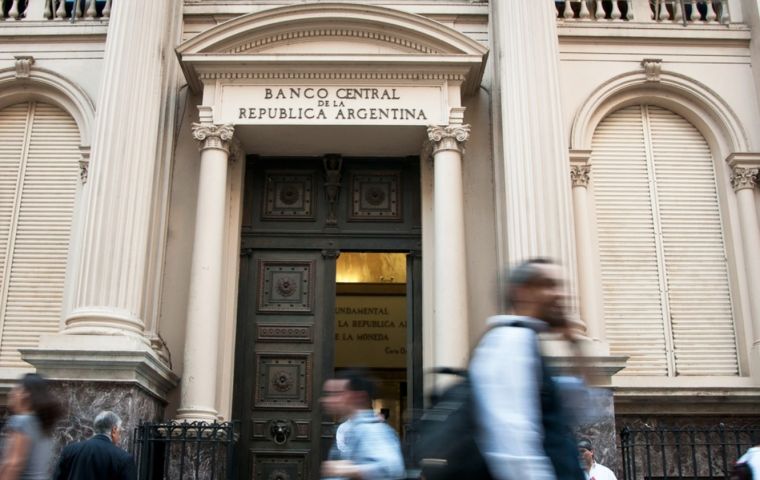MercoPress. South Atlantic News Agency
Argentine central bank cuts basic rate to 28%; annual inflation target 15%
 Argentina also has a new 2019 inflation target of 10% and 5% for 2020. “This pathway is now the objective of central bank monetary policy,” the bank said
Argentina also has a new 2019 inflation target of 10% and 5% for 2020. “This pathway is now the objective of central bank monetary policy,” the bank said Argentina’s central bank cut its policy rate to 28% from 28.75%, two weeks after relaxing its 2018 inflation target, the bank said on Tuesday. The bank’s first rate cut in 14 months came after a December 28 news conference announcing an official inflation target for this year of 15%, up from the bank’s previous target range of 8% to 12%.
Argentina also has a new 2019 inflation target of 10% and 5% for 2020. “This pathway is now the objective of central bank monetary policy,” the bank said in a statement, adding it will be “cautious” in its approach to hitting the new targets.
“Naturally, if you seek a lower rate of disinflation than planned originally, the path of monetary policy will be less contractive than the one before,” the statement said.
Economist Guido Lorenzo of local consultancy ACM Consultores said Tuesday’s rate cut should have been deeper. “Going forward it will be much more difficult to cut the rate after January and February inflation data comes in,” he said.
“The time was now,” he added. “Going forward it will be more difficult to justify a drop in rates.”
Based on expectations of lower interest rates, the local peso has weakened 1.7% so far this month to 18.9650 per U.S. dollar, after falling 14.9% in full year 2017. A survey of economists published by the central bank earlier this month showed median inflation expectations of 17.40% for 2018 and 11.6% for 2019.
Argentine December and full-year 2017 consumer price data is scheduled to be released on Thursday. Inflation was 21% in the first 11 months of 2017.




Top Comments
Disclaimer & comment rules-

Read all commentsBy lowering the tax rate by less than one per cent, Central Bank governor Federico Sturzenegger has defied cabinet chief Marcos Peña, who wanted a larger rate reduction.
Jan 10th, 2018 - 07:48 pm -1Obviously lowering high interest rates could contribute to stimulate the economy, however it could direct the economic agents towards the dollar away from Lebac bonds, which are in pesos, and destabilize the economy's current precarious balance.
In an economy dominated by financial speculation and supported mainly by foreign borrowing as opposed to healthy growth, the avenues are narrow and lead only to a cliff.
Curious how those who, during the last government's term were calling Argentina a “serial defaulter” today cheer and ignore the massive foreign borrowing of a government that is, as we speak, creating the conditions for serious financial difficult - perhaps even a new default.
Commenting for this story is now closed.
If you have a Facebook account, become a fan and comment on our Facebook Page!